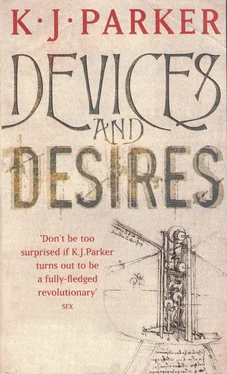K Parker - Devices and Desires
Здесь есть возможность читать онлайн «K Parker - Devices and Desires» весь текст электронной книги совершенно бесплатно (целиком полную версию без сокращений). В некоторых случаях можно слушать аудио, скачать через торрент в формате fb2 и присутствует краткое содержание. Жанр: Фэнтези, на английском языке. Описание произведения, (предисловие) а так же отзывы посетителей доступны на портале библиотеки ЛибКат.
- Название:Devices and Desires
- Автор:
- Жанр:
- Год:неизвестен
- ISBN:нет данных
- Рейтинг книги:3 / 5. Голосов: 1
-
Избранное:Добавить в избранное
- Отзывы:
-
Ваша оценка:
- 60
- 1
- 2
- 3
- 4
- 5
Devices and Desires: краткое содержание, описание и аннотация
Предлагаем к чтению аннотацию, описание, краткое содержание или предисловие (зависит от того, что написал сам автор книги «Devices and Desires»). Если вы не нашли необходимую информацию о книге — напишите в комментариях, мы постараемся отыскать её.
Devices and Desires — читать онлайн бесплатно полную книгу (весь текст) целиком
Ниже представлен текст книги, разбитый по страницам. Система сохранения места последней прочитанной страницы, позволяет с удобством читать онлайн бесплатно книгу «Devices and Desires», без необходимости каждый раз заново искать на чём Вы остановились. Поставьте закладку, и сможете в любой момент перейти на страницу, на которой закончили чтение.
Интервал:
Закладка:
He closed his eyes for a moment. There wasn't, as far as he was aware, a specification for the cutting and piercing of flesh, the bending and breaking of bone and sinew; there was no established tolerance through which perfection in this sphere could be expressed. In the absence of anything of the sort, it was impossible to establish what represented a permissible degree of waste. However, the basic rule must still apply: where a more exact result can be obtained by total destruction, it is preferred. He closed his hands around his face, and tried to find the absolution those words ought to bring. It was only logical. The mechanism he'd built wasn't some whim of his own. It was the only possible device that could be capable of achieving his only objective, and that objective had been forced on him by the men who'd taken him away from his house, his family, the only things in the world that mattered to him. So he'd followed the design to its logical end, accepting the inevitability of a high level of wholly destructive waste; in effect, he'd been following the design specified by the actions of his betters in the Guild, and it was the imperatives of precision that had destroyed Miel Ducas and Duchess Veatriz and Duke Orsea, and were even now threading their nervous way through the tunnels in the rock under his feet, heading for a gate that shouldn't have been blocked, with a view to the laying waste, by cutting and attrition, of an entire city.
He was glad that it was all outside his control for a while.
They had no idea what to expect as they lifted the heavy trapdoor. They weren't supposed to know that the whole plan was the work of the traitor-abominator Vaatzes, but the deputy chief of staff had felt obliged to tell them, just in case it was all a trap. It wasn't the sort of information that inspires confidence, particularly when taken together with the obvious mistake about the gate.
Nevertheless, a colour-sergeant by the name of Pasargades lifted the trapdoor, took a deep breath and scrambled out of the tunnel into the sweet night air. He may have ducked his head involuntarily, as though anticipating a cut or a blow, but nothing like that happened. He jumped out, looked round quickly and dropped to his knees to help the next man out.
The first thing they noticed was how quiet it was. No voices, which was encouraging; no boots grinding on the cobbles, no scrape of heels or spear-butts. There was a certain degree of light, from a lantern hanging off a bracket five yards or so away. So far, the abominator had done them proud.
Thirty-six men followed Colour-Sergeant Pasargades out of the tunnel: two infantry platoons, one squad of engineers and the commanding officer, Captain Boustrophedon. They were light enough on their feet-minimum armour, sidearms only, and the engineers' tools. All they had to do was breach the rubble blocking the gate. The army would do the rest.
The captain led the way, as was only right and proper. One platoon of infantry followed him, then the engineers, then the second infantry unit. They had a fair idea of where to go. The last Mezentine diplomat to visit the city had briefed them on the layout of the gatehouse, not that there was much to tell. Through the archway into a large empty room, and there was the gate.
Or there it wasn't. Instead, blocking a ragged-sided hole in the wall, there was a heap of wicker baskets, piled on top of each other, each one filled with rubble. In front of the heap someone had made a start on a brick wall, but as yet it was only three courses high. You could step over that without any bother. Propping up the heap of baskets were half a dozen beams-they looked like rafters, or something of the sort. Presumably the idea was that if there was another battering-ram attack, the beams would to some extent brace the baskets against the impact; either that, or the bricklayers were afraid that the heap was unsteady and might come crashing down on them at any moment. All in all, it was a fairly unconvincing piece of fortification. Once the brick wall was finished, of course, it'd be better, though not much. Not that it mattered. Even if the gate was wide open, the Mezentines didn't have the manpower for a direct assault, not if their entry was resisted.
Simple, thought Captain Boustrophedon: knock away the beams, get a grappling-hook into a few of those baskets, and pull. Of course, you wouldn't live to enjoy being a hero. The rubble would come down on you like a rockslide in the mountains, you'd be a bag full of splintered bones when you died.
Someone was calling out; an enquiry rather than a challenge, but it had to go unanswered. More voices, which meant choosing a course of action quickly and hoping it'd work. Well, the captain thought, if we can't have the rubble collapsing inwards, we'll have to try pushing instead. He wasn't particularly happy about it, but there wasn't time to draw diagrams and calculate angles.
'Get hold of those beams and push,' he ordered.
The back platoon were already engaged. He heard a shout or two, then a yell as someone got hurt-them or us, hardly matters. So long as this gateway's opened up in the next fifteen seconds.
They pushed. A couple of arrows skittered off the side wall, someone was yelling, 'In there!' They pushed again, and in the split second it took for Boustrophedon to realise he'd made the wrong decision, the Eremian guards swept away the nine men of the back platoon who were still standing, and charged into the gatehouse.
Boustrophedon lived long enough to see the first gleam of light through the breach. He hardly noticed it, although it meant he'd succeeded; there was surprisingly little pain, but his sight was being squeezed into a narrow ring by encroaching darkness. The air was full of dust. He died, and a Mezentine soldier stumbling through the breach trod on his head before an Eremian shot him. That hardly mattered, in the grand scheme of things. There were plenty more where he'd just come from. What was left of the defenders was shoved out of the way as the assault party burst through. The Eremian night patrol, who might have made a difference if they'd arrived twenty seconds earlier, hardly slowed the attack up at all. The first objective, the square behind the main gate, was secured within a minute of the opening of the breach; five minutes, and the Mezentines were on the wall, racing along the ramparts to secure access to the whole city.
Chapter Twenty-Four
Miel Ducas had, remarkably enough, fallen asleep. He hadn't thought he'd be able to sleep, with Vaatzes' words rattling round inside his head like stones in a bucket. Nevertheless, when the guard captain burst in, he was flopped in his chair, eyes closed.
The captain was yelling at him. At first he thought, he's come to kill me, but it soon occurred to him that that wouldn't call for panic-stricken shouting, so he listened to what the man was saying.
'They're on the wall,' he said, which didn't make sense. 'We can't hold them. Come on, get out.'
Get out he understood. 'Hold on,' he mumbled, 'I'll get my things.' But the captain grabbed him by the elbow and dragged him towards the door. He was too sleepy to resist.
'Head for the palace,' the captain was saying, and that didn't make sense either.
'What's going on?' Miel asked.
'The Mezentines,' the captain snapped back at him. 'They're inside the city, and up on the wall. They'll be here any moment now. Head for the palace.'
Still didn't make sense. We've won the war, how come there's Mezentines in the city? Miel knew better than to argue, however. The captain let go of his elbow and ran off, leaving him standing in the little courtyard. Well, Miel thought, I suppose I'm free.
If there really were Mezentines… He found it impossible to believe. How could they have got in? Surely there'd have been an alert, trumpets blasting and men shouting, war noises. Ridiculous. Even so; head for the palace. He could do that.
Читать дальшеИнтервал:
Закладка:
Похожие книги на «Devices and Desires»
Представляем Вашему вниманию похожие книги на «Devices and Desires» списком для выбора. Мы отобрали схожую по названию и смыслу литературу в надежде предоставить читателям больше вариантов отыскать новые, интересные, ещё непрочитанные произведения.
Обсуждение, отзывы о книге «Devices and Desires» и просто собственные мнения читателей. Оставьте ваши комментарии, напишите, что Вы думаете о произведении, его смысле или главных героях. Укажите что конкретно понравилось, а что нет, и почему Вы так считаете.












